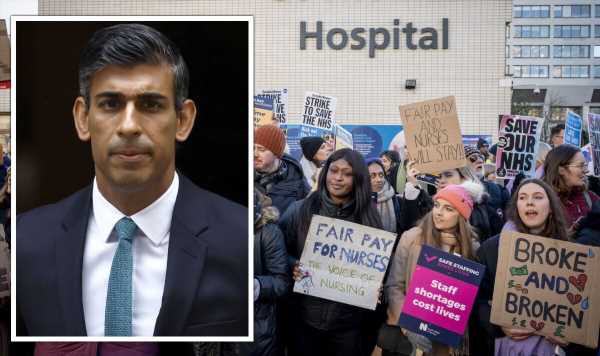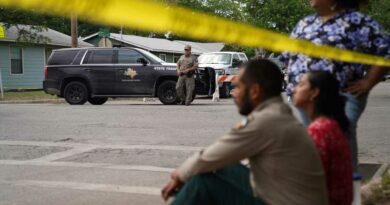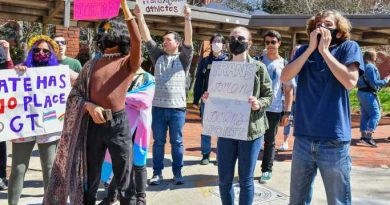Hopes for last-ditch talks to prevent nurses’ strike
Nurses' strikes: Jenny McGee explains importance of action
We use your sign-up to provide content in ways you’ve consented to and to improve our understanding of you. This may include adverts from us and 3rd parties based on our understanding. You can unsubscribe at any time. More info
Pat Cullen, head of the Royal College of Nursing, told Rishi Sunak they can make sure this is the last nurses strike of his premiership.
Sources said the RCN – which has called for a 19 per cent pay rise – “wants to negotiate” a fair deal and is hoping the Government will agree to return to talks.
Ms Cullen added in her message to the Prime Minister: “It is now a week since I’ve had any contact with your Government.
“By working together, we can make this the last nurse strike of your premiership. It will be with a very heavy heart that nurses return to the picket lines in January.
“We aren’t looking for a miracle, this really is in your gift. I won’t dig in, if they won’t dig in.”
Last night Health Secretary Steve Barclay was set to contact unions to urge a fresh round of talks aimed at averting further disruption, amid warnings more action could put patients in danger.
He told the Daily Express: “My primary duty is to do everything possible to protect the safety of patients and wider public.
“That is why I want to sit down with union leaders to discuss how we can ensure vital services are covered during industrial action.”

Downing Street looked likely to reject a proposal to give the nurses a one-off lump-sum payment in an attempt to end the industrial action.
It was one of the measures Mr Barclay suggested as a compromise in crunch Whitehall meetings.
The RCN had hinted it would be open to discussing such a payment, but warned there could be no “political quick-fixes”.
The union added that further talks must take place within 48 hours of the second day of strike action tomorrow, or more will be planned for January.
But the Express understands the RCN will budge on its demands, and Unison, which represents paramedics set to strike on Wednesday, says it will not be “unreasonable” and is open to talks.
However, the NHS is still facing the most widespread disruption in decades this week as the nurses and ambulance workers strike on consecutive days. More than 70 health trusts and organisations will be hit by tomorrow’s nurse action.
And strikes by ambulance workers on Wednesday will hit 10 out of the 11 trusts in England and Wales.
Mr Barclay warned the unions they must ensure “sufficient cover” is in place for emergencies.
Asked if calling in troops was a last resort as he visited Chelmsford Ambulance Operations Centre yesterday, he said: “It’s important a responsible Government looks at all the contingency plans we can to mitigate any risk to patient safety.
“But it’s the unions that need to ensure there is sufficient cover to meet obligations in terms of life-threatening responses.”
Cabinet minister Oliver Dowden, in charge of the Government’s handling of the strikes, insisted ministers were “always open to talks”. But he added that it could not give huge pay rises as it risked making everyone else poorer by fuelling inflation.
He added Government would only consider bigger pay increases for public sector workers once the economy was stronger.
In July, the NHS pay review body recommended a £1,400 rise, with slightly more for experienced nurses – an increase of about four per cent on average.
But nurses called for a 19 per cent rise, while unions representing ambulance workers have linked negotiations to inflation.
However, sources insist the RCN’s demand is believed to be its start-point for talks, with any new offer to be put to members.
And unions representing striking paramedics say they want the Government to put an offer on the table so negotiations can restart.
UNISON head of health Sara Gorton said: “Health workers don’t want to strike, nor do they wish to inconvenience or harm anyone.
“But something has to give and that must be the Government’s stance on NHS pay. The Health Secretary’s known for months that without acting to boost wages and ease staffing problems, there’d be disruption this winter. Everyone wants a healthy, well-staffed NHS.
“Steve Barclay must change tack and put a proper wage offer on the table. That approach has worked so far in Scotland. It could work elsewhere too, if the Government would only give it a go.”
But Mr Dowden reflected the tough stance in Government in the face of the strikes, vowing to be “resolute” as pressure grows.
He said: “We’re trying to be reasonable, we’re trying to be proportionate and we’re trying to be fair. But in return, the unions need to be fair and reasonable. They should call off these strikes.”
He added the Government was trying to “take the politics out” of the issue of pay by accepting the NHS review body’s recommendations.
Union bosses are in favour of a pay model similar to that used by the Scottish government.
There, sources say, unions rejected two rounds of increased offers before a third resulted in a deal that was “reluctantly” agreed despite being below inflation.
Ministers have announced plans to deploy 1,200 troops to cover for striking staff, alongside more than 1,000 civil servants. But the Chief of the Defence Staff, Admiral Sir Tony Radakin, has said the military should not be treated as “spare capacity”.
Source: Read Full Article




